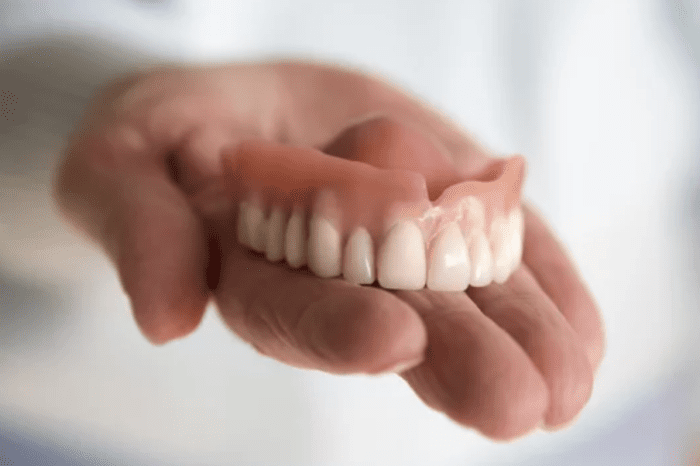Dentures, also known as false teeth, are prosthetic devices that are used to replace missing teeth. They are made of acrylic resin and can be easily removed from the mouth for cleaning and maintenance. However, dentures are also prone to damage if you don’t take care of them properly. One crucial factor in maintaining dentures is keeping them moist.

Negative Effects of Dry Dentures
Letting dentures dry out can have several negative effects on their quality and durability. First and foremost, dry dentures can become brittle and prone to cracking or breaking, making them uncomfortable and difficult to wear. Dryness can also cause warping, shrinking, or distortion of the dentures, altering their fit and making them uncomfortable to wear.
As a result, you may need to visit the dentist more frequently. If you constantly need adjustments, you can suffer in your comfort, time, and money.
Moreover, dryness can lead to the buildup of bacteria and other harmful microorganisms on the dentures. When more bacteria are in your mouth, you have an increased risk of infections. To prevent these negative effects, denture wearers should store their dentures properly and keep them moist at all times.
Why Must Dentures Be Moist?
Firstly, dentures must stay moist because they are made of acrylic resin. This material can dry out and become brittle when it is not in contact with moisture. This is where you can experience discomfort or irritation. This can also cause problems with chewing and speaking, affecting a person’s quality of life.
Additionally, dry dentures can build up bacteria on the surface, which can lead to infections or bad breath. Keeping dentures moist can help prevent these problems and prolong the lifespan of the dentures.
Secondly, keeping dentures moist can also protect your oral health. If you don’t keep your dentures moist, it can cause irritation to the gums and oral tissues. This can lead to inflammation, soreness, and even infections. The moisture in the mouth is essential to keeping the tissues healthy and lubricated, and dry dentures can remove this necessary moisture.
Moreover, when you don’t keep dentures moist, they can create an environment where bacteria can thrive. Bacteria can cause gum disease, leading to tooth loss and other serious health problems.
How to Keep Dentures Hydrated
One way to keep dentures moist is by storing them in water or a denture cleaning solution. Denture cleaning solutions help remove plaque, stains, and bacteria from the surface of the dentures. It is essential to follow the manufacturer’s instructions when using a denture cleaning solution to ensure you use it correctly.
You should rinse dentures thoroughly after cleaning to remove any residual cleaning solution. Then, you can store them in water or a denture-soaking solution. This will help to keep them moist and prevent them from drying out.
Another way to keep dentures moist is by keeping the mouth hydrated. Drinking plenty of water throughout the day can help to keep the mouth moist and prevent dryness. This can also help to prevent bacterial growth and infections. Chewing sugar-free gum can also help to stimulate saliva production, which can help to keep the mouth moist and reduce the risk of infections.
